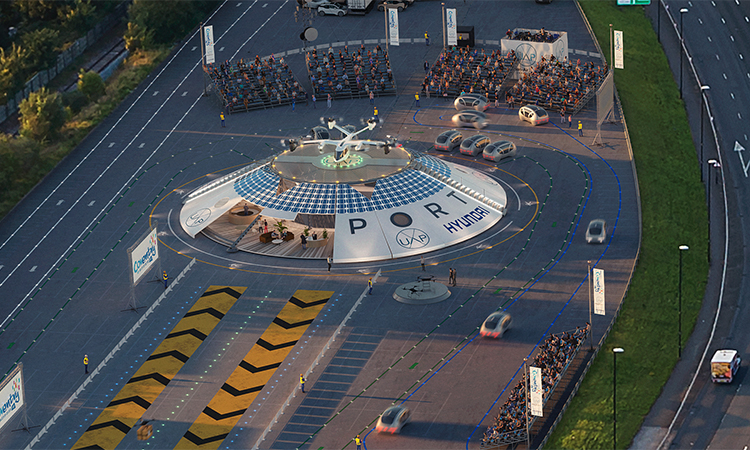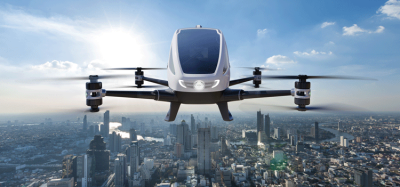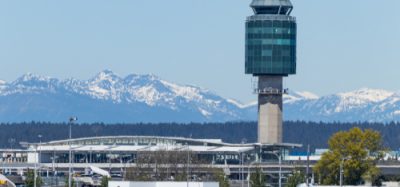Clean urban air travel to become reality with plans for worldwide UAM hubs
- Like
- Digg
- Del
- Tumblr
- VKontakte
- Buffer
- Love This
- Odnoklassniki
- Meneame
- Blogger
- Amazon
- Yahoo Mail
- Gmail
- AOL
- Newsvine
- HackerNews
- Evernote
- MySpace
- Mail.ru
- Viadeo
- Line
- Comments
- Yummly
- SMS
- Viber
- Telegram
- Subscribe
- Skype
- Facebook Messenger
- Kakao
- LiveJournal
- Yammer
- Edgar
- Fintel
- Mix
- Instapaper
- Copy Link
Posted: 16 September 2021 | International Airport Review | No comments yet
Urban-Air Port has announced a development plan for 65 urban air mobility infrastructure hubs worldwide in partnership with Hyundai Motor Group.


Credit: Urban Air Port
Urban-Air Port has announced plans with the Urban Air Mobility Division of Hyundai Motor Group to develop 65 electric urban-air ports worldwide to meet the growing demand for autonomous airborne drones and electric vertical take-off and landing (eVTOL) passenger vehicles. The partnership aims to establish a global network of urban-air ports and provide the essential infrastructure to unlock clean urban air mobility worldwide. The partnership forms a key part of Urban-Air Port’s plan to build 200 sites globally in the next five years.
Investment in the urban air mobility industry has exploded this year, with $4.7 billion USD announced for the development of eVTOL vehicles. Companies including Joby Aviation, Archer Aviation, Lilium and Vertical Aerospace have all announced SPAC (Special-Purpose Acquisition Company) investments to bring eVTOLs to market within the decade and the industry is forecast to hit $1 trillion USD in the next 20 years.
However, the lack of infrastructure to support these vehicles is a major block on market growth, with experts at NASA saying infrastructure constraints will create a significant barrier to urban air mobility in the near term. Despite this, only 3 per cent of the investment so far this year ($150 million USD) is in the physical infrastructure.
Urban-Air Port is the only company solely focused on deploying the infrastructure-technology essential for eVTOLs and delivery drones to operate. It plans to plug the infrastructure gap with more than 200 electric air mobility hubs worldwide in the next five years to meet expected global demand. The world’s first fully operational urban-air port – named Air-One – will be unveiled early next year in Coventry, UK.
Ricky Sandhu, Founder and Executive Chairman of Urban-Air Port®, said: “The sector is soaring and we know that a future with electric flying vehicles and drones in cities is going to be a reality soon. But it can’t happen if we don’t have the infrastructure on the ground and in the air to make it happen. Urban-Air Port will change the way we travel forever – unlocking clean urban air transport for everyone, improving connectivity in congested cities, cutting pollution and boosting productivity.”
Urban-Air Port’s modular hubs are specifically designed for compact environments, supporting any eVTOL or drone vehicle, and with maintenance and charging able to take place on-site. The ultra-compact off-grid design enables urban-air ports to be located in dense urban areas and remote locations and can be easily moved to alternative sites, as the air-mobility sector develops. This design also means the sites are ideal for disaster emergency management, such as natural disasters. Urban-air ports can rapidly deploy drones and other eVTOL vehicles to collect and transport emergency supplies, equipment and people where needed. To support this future, Urban-Air Port today also announces a partnership with world leading Hydrogen Fuel Cell pioneer, AFC Energy PLC, to provide zero emission off-grid power for future sites. The system will be deployed at Urban-Air Port’s Air One site in Coventry.
Uniquely, Urban-Air Port is designed as an integrated hub for all sustainable transport, including drones, eVTOLs, electric vehicles (EVs), buses or scooters, ensuring an integrated approach to the decarbonisation of cities. Cargo and passengers can be safely and quickly loaded and unloaded, integrating seamlessly with onward transport. At the same time, EVs, buses and scooters can access on-site charging. Urban-Air Port is also developing a digital app-based platform to enable seamless door-to-door travel.
Hyundai Motor Group will work with Urban-Air Port to develop 65 sites in key locations across the U.S., UK, EU and Asia Pacific. The partnership represents a statement of confidence in the ability of the UK-based company to unlock the global market before 2030 and is an integral part of Hyundai Motor Group’s vision to provide smart mobility solutions for the changing world. The group is developing its own eVTOL vehicle, in tandem with helping create the supporting ecosystem, and plans to enter service in 2028.
Pamela Cohn, Chief Operating Officer and U.S. General Manager for the Urban Air Mobility Division of Hyundai Motor Group, said: “Urban Air Mobility will be integral to how we get from A to B this century. Hyundai Motor Group has a bold vision for future mobility and is committed to making the human and technological investments needed to usher in a new era of transport. Urban-Air Port is key to opening up safe, affordable, zero-emission mobility, which will take urban air mobility from science fiction to tangible reality.”
Ricky Sandhu added: “The deal with the Urban Air Mobility Division of Hyundai Motor Group is a massive step towards our vision of installing hundreds of urban-air ports worldwide to maintain our position at the forefront of this sector and support the rapid expansion of urban air mobility in this decade.”
Urban-Air Port is also supported by the UK government via the Future Flight Challenge to develop aviation infrastructure and systems that enable the next generation of electric and autonomous air vehicles.
Minister for Aerospace, Paul Scully, said: “The government-backed Urban-Air Port heralds a new, convenient and sustainable way to travel within the UK, improving connectivity between cities, whilst helping us to build back greener.
“The UK is at the cutting-edge of new technologies in the pursuit of a net zero economy by 2050. Making sure that the infrastructure exists for these new modes of transport is key to making zero emission urban flight an everyday reality.”
Gary Cutts, Future Flight Challenge Director at UKRI, said: “Urban-Air Port will revolutionise cities across the world, making them more connected, cleaner and accelerating our green economic recovery. This deal, with one of the world’s largest mobility companies, is a testament to what the Future Flight Challenge fund is all about – supporting world-leading innovation to grow globally and position the UK at the forefront of the green air mobility revolution.”
Urban-Air Port is also in discussions with multiple potential partners and investors, as part of its Series A funding round, closing Q4 this year, to support its rapid commercialisation and global growth.
Related topics
Advanced air mobility (AAM), Air freight and cargo, Air traffic control/management (ATC/ATM), Autonomous Technology, Sustainability, Sustainable development
Related organisations
Related regions
Asia Pacific and Oceania, Europe, United Kingdom and Ireland

















